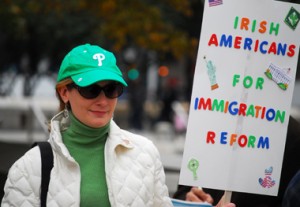He was eight when his father left home, reluctantly leaving his family behind to travel thousands of miles across the ocean to America to earn money to support them. He was 16 when he next saw his father. It was, he says, the meeting of two strangers.
“When he left, I was little. When I next saw him, I was taller than my father. And he was not familiar to me. He was shocked when he saw me too.”
It could be any immigrant’s story, this old familiar tale of desperation and families torn apart. But in this case it belongs to Xu Lin, a young man born in China’s Fujian Province whose father is now trapped in America without a green card.
“My grandmother passed away two years ago and in our tradition, the oldest son should be there to send his parents away,” Lin told a crowd gathered for an immigration reform rally in the shadow of Philadelphia’s City Hall on Monday, October 12. “My father is the oldest son in the family, but he could not go because of his immigration status. I feel really sad for my dad and grandmother.”
The rally, organized by the group Reform Immigration for America, was a send-off for a handful of local people who were traveling to Washington, DC, the next day to attend a larger rally at the Capitol to demand action on immigration reform before the end of the year.
Nearly 8,000 people—including representatives from Philadelphia’s Irish Immigration Center—spent the day lobbying in congressional offices and massing on the Capitol lawn to show support for new programs that will make it easier for immigrants to become citizens and for the abolition of old programs that make them criminals.
One of those local representatives was Sarah Conaghan, a Delaware County woman whose father, Tom Conaghan, founded the Irish Immigration Center. She stressed the need to “put a different face” on immigration, one that reflects the true diversity of immigrants “who come from Ireland, Honduras, Poland, every country you can imagine.”
The Pennsylvania group met with aides for Bucks County Rep. Patrick Murphy, Delaware County Rep. Joe Sestak and Senators Bob Casey Jr. and Arlen Specter, though their lobbying was preaching to the converted. Those lawmakers are on record as supporting immigration reform.
Among the proposed laws immigration reformers would like to see passed is the Reuniting Families Act, set in play by New Jersey Senator Robert Menedez, New York Senators Charles Schumer and Kirsten Gillibrand, and the late Senator Edward Kennedy of Massachusetts. The bill would end lengthy wait times for foreign-born relatives of US citizens and permanent residents to be granted visas. There is currently an immigration processing backlog of 5.8 million people, or about 20,000 people a year. Supporters say that the US economy takes a hit as a result: Many of these people are at retirement age when they finally arrive so are unable to join the workforce or pay taxes.
While the rally was going on in Washington, Siobhan Lyons, executive director of the Philadelphia Irish Immigration Center, was in New York with a coalition of Irish groups meeting with Irish Foreign Minister Micheal Martin. Martin was doing the rounds of national lawmakers to take a read on the future of the reform bills now on the table. “He said that there’s a small window at the beginning of the year where we need to get comprehensive reform in,” says Lyons.
In past years, the Irish got a special pass. “The Irish have benefited from special visa programs and there has been a hope in the Irish community that we’ll get this again, but it’s not happening,” says Lyons. And, she says, it shouldn’t. There are an estimated 50,000 undocumented Irish in the US. There are millions of Hispanics.
“The whole coalition of Irish immigration organization is planning a push—it might be a postcard campaign—to make sure that the entire community gets behind comprehensive reform that applies to everyone, with no ethnic group singled out.”
She says she’s hoping the Irish have long memories. “Not long ago, the Irish were met with signs that said, ‘No Irish need apply.’ We were once the immigrants no one wanted. We know what it’s like to be the people everyone hates. It all turned out great for us. . .and everyone else.”
For Conaghan, the current immigration situation has a “there but for the grace of God go I” component. It’s personal.
“I’m the daughter of two immigrants and when they came here in the 1970s, there was a road to citizenship then and they took it,” says Conaghan. “Since 1996, our community been devastated something called the Illegal Immigration Reform Act, which removed every legal road and bridge for Irish immigrants to become citizens. It eliminated the path to legalization. Their punishment: Those who remain 180 days after their visas are up can be barred from returning to the US for up to 20 years. The result of all this is that people who remained because they had put down roots—they settled down and had kids—have been trapped here, living in the shadows for over 15 years. I know some of these families and they haven’t been able to go back to see grandparents who live in Ireland.”
Roughly 20 percent of Pennsylvania’s population has Irish roots, with a million Irish and Irish-Americans living in the Philadelphia metropolitan area.
“Yet our historic contribution to this country has been ignored,” says Conaghan. “This is such an important issue for our community locally, and every community. Our country was built by immigrants.”


